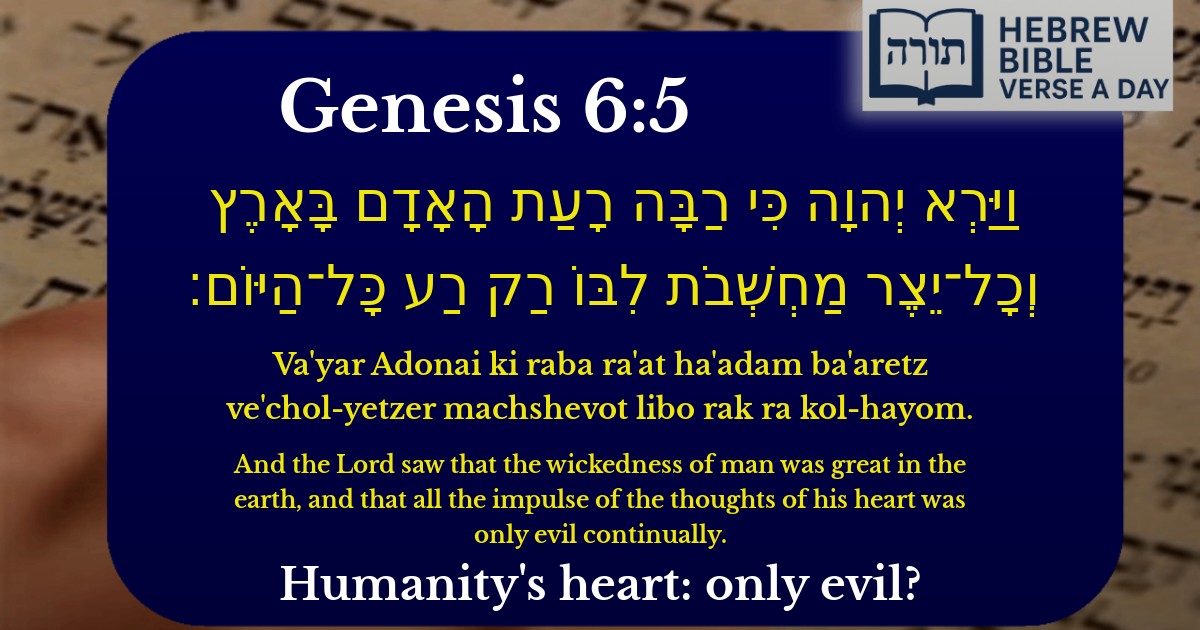Join Our Newsletter To Be Informed When New Videos Are Posted
Join the thousands of fellow Studends who rely on our videos to learn how to read the bible in Hebrew for free!
Hebrew Text
וַיַּרְא יְהוָה כִּי רַבָּה רָעַת הָאָדָם בָּאָרֶץ וְכָל־יֵצֶר מַחְשְׁבֹת לִבּוֹ רַק רַע כָּל־הַיּוֹם׃
English Translation
And the Lord saw that the wickedness of man was great in the earth, and that all the impulse of the thoughts of his heart was only evil continually.
Transliteration
Va'yar Adonai ki raba ra'at ha'adam ba'aretz ve'chol-yetzer machshevot libo rak ra kol-hayom.
Hebrew Leining Text
וַיַּ֣רְא יְהֹוָ֔ה כִּ֥י רַבָּ֛ה רָעַ֥ת הָאָדָ֖ם בָּאָ֑רֶץ וְכׇל־יֵ֙צֶר֙ מַחְשְׁבֹ֣ת לִבּ֔וֹ רַ֥ק רַ֖ע כׇּל־הַיּֽוֹם׃
וַיַּ֣רְא יְהֹוָ֔ה כִּ֥י רַבָּ֛ה רָעַ֥ת הָאָדָ֖ם בָּאָ֑רֶץ וְכׇל־יֵ֙צֶר֙ מַחְשְׁבֹ֣ת לִבּ֔וֹ רַ֥ק רַ֖ע כׇּל־הַיּֽוֹם׃
🎵 Listen to leining
Parasha Commentary
📚 Talmud Citations
This verse is quoted in the Talmud.
📖 Sanhedrin 108a
The verse is referenced in the context of discussing the generation of the Flood and their wickedness, illustrating how their thoughts were continuously evil.
📖 Avodah Zarah 5a
The verse is cited to discuss the nature of human inclination towards evil and the divine response to human wickedness.


Understanding the Verse in Context
The verse (Bereshit 6:5) describes Hashem's observation of humanity's moral decline before the Mabul (Flood). The phrase "רַבָּה רָעַת הָאָדָם" ("the wickedness of man was great") indicates a pervasive corruption that had spread throughout society. Rashi explains that this wickedness was not merely occasional but had become the dominant characteristic of human behavior.
Nature of Human Inclination
The verse emphasizes "כָּל־יֵצֶר מַחְשְׁבֹת לִבּוֹ רַק רַע כָּל־הַיּוֹם" ("all the impulse of the thoughts of his heart was only evil continually"). The term "יֵצֶר" (yetzer) refers to the inclination of the human heart. The Ramban (Nachmanides) notes that this describes a complete dominance of the yetzer hara (evil inclination), where even the potential for good was overshadowed by constant evil thoughts and actions.
Midrashic Insights
Contrast with Later Generations
The Sages contrast this generation with later ones, such as the Dor Haflagah (Generation of the Dispersion), who sinned but retained some moral boundaries. Here, the total corruption left no room for repentance, necessitating the Flood as a divine response (see Rambam, Hilchot Teshuva 6:3 on the conditions for irrevocable judgment).
Moral Lesson
This verse serves as a warning about the dangers of unchecked moral decay. The Kli Yakar (Rabbi Shlomo Ephraim Luntschitz) emphasizes that when evil becomes constant ("כָּל־הַיּוֹם"), society loses its capacity for self-correction, inviting divine intervention.